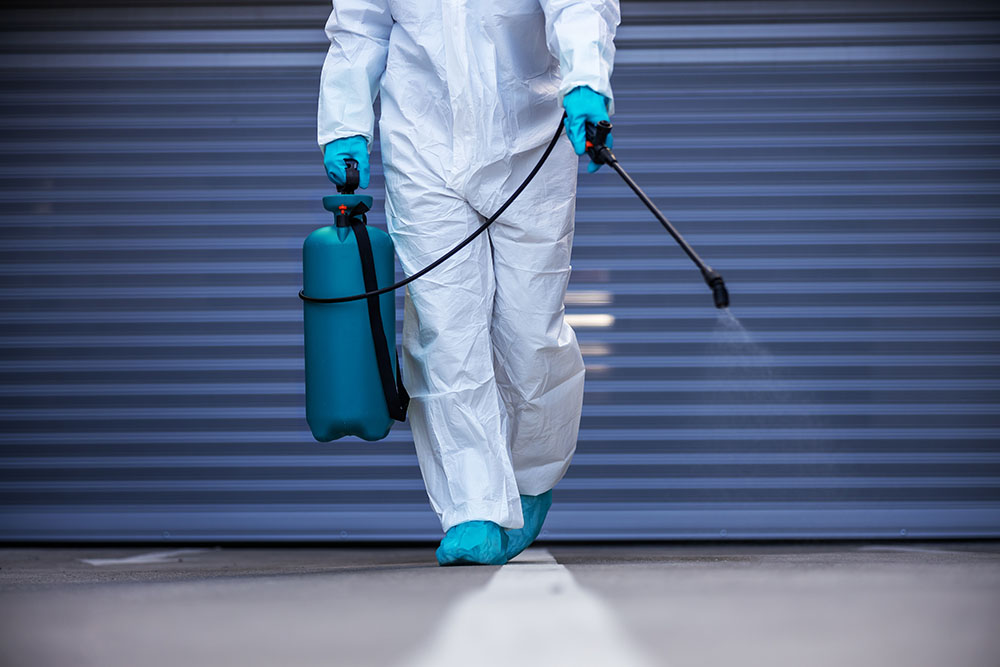Is Trauma Cleaning Dangerous?

CONTENTS
- What is trauma cleaning?
- The importance of trauma cleaning
- Hazards associated with trauma cleaning
- The process of trauma cleaning
- Protective measures in trauma cleaning
- Becoming a professional trauma cleaner
- How to act when you discover a trauma scene
- Frequently asked questions
- Get in touch
After a tragic incident that leaves behind a crime scene or accident site, various biological hazards can affect bystanders without the proper safety measures. This task falls to trauma cleaners, and it is often intense and challenging work with potential dangers, requiring resilience and safety.
In moments of tragedy, such as murder, suicide or unattended deaths, ICE Cleaning can step in. Our NACSC-approved experts offer trauma clean-up services, employing the latest solutions and technology to decontaminate an area effectively.
Read on to learn more about trauma cleaning, its importance for physical and psychological health, the dangers involved, and protective measures taken by professionals.
What is trauma cleaning?
Trauma cleaning, often associated with crime scene cleaning, involves thorough decontamination of areas impacted by traumatic incidents. This could include scenes of violent crimes or unattended deaths.
These environments can pose significant health risks due to bloodborne pathogens and biological hazards. As one sets out to perform trauma cleaning, it is essential to possess a precise set of abilities and expertise in order to deal with the associated risks.
The origins of trauma cleaning are linked with advancements in forensic science and public health awareness.
The necessity for this specialist service has grown over time as we have become more aware of potential diseases that can transmit through improper handling and disposal methods at trauma scenes.
The importance of trauma cleaning
Trauma cleaning is no ordinary job. It is an essential service that goes beyond cleaning. Managing the consequences of traumatic occurrences, such as violent offences, is an indispensable service that aids in safeguarding public health and restoring a sense of normality.
It is not just about physical cleaning but also managing potential biohazards like bloodborne pathogens. Without proper cleaning, these can pose serious health risks to others who might come into contact with the scene.
Moreover, trauma cleaners provide much-needed support for individuals and communities affected by distressing incidents. They help restore spaces to their original state - providing comfort during difficult times and aiding in psychological healing.
Hazards associated with trauma cleaning
Despite its importance, trauma cleaning is a dangerous job. These dangers range from biological risks to psychological distress. Trauma scenes often involve biohazardous materials such as blood and other bodily fluids.
Exposure to these scenes can lead to infections like Hepatitis B or C and HIV if not handled correctly. So, cleaners must wear regularly proper personal protective equipment (PPE).
In addition to physical harm, trauma cleaners also face significant emotional strain due to the nature of their work. Dealing with death on a regular basis can have detrimental impacts on mental wellbeing in the long term.
Harmful substances like drugs or chemicals found at crime scenes could pose a further risk for exposure injuries. Safe handling procedures need to be adhered to.
The process of trauma cleaning
Trauma cleaning is a meticulous process, starting with an initial assessment to gauge the extent of contamination. This involves identifying hazards such as biohazardous materials, sharp objects or structural instability.
After assessing the area, individuals in protective clothing remove infected materials for secure disposal. Amongst these materials are articles like furniture, carpets and personal items that may have experienced exposure to biohazardous elements.
The next step is thorough the sanitisation of all surfaces using industrial-grade disinfectants. Cleaners also use odour neutralisers to eliminate any lingering odours.
Finally, they validate their work through ATP testing - a method used to detect remaining organic matter. If successful, the area becomes habitable again after this intense cleaning process.
Protective measures in trauma cleaning
Trauma cleaning is a dangerous job, exposing workers to biohazards like bloodborne pathogens. By implementing appropriate precautions, potential hazards can be effectively contained and minimised.
Personal Protective Equipment (PPE)
PPE plays an essential role in trauma cleaning. It acts as a barrier between the cleaner and harmful substances, reducing exposure risk significantly.
Common PPE includes gloves, respirators and full-body suits. Face shields or goggles protect against splashes, while boots ensure no contamination seeps through footwear.
Safety protocols
Besides wearing proper gear, following stringent safety protocols also ensures worker protection during clean-ups. These rules often involve handling sharp objects and disposal methods for biohazardous waste.
A thorough decontamination process post-clean-up further helps prevent potential health hazards from lingering on equipment or personnel after a job completion.
Becoming a professional trauma cleaner
Becoming a professional trauma cleaner is a niche and intense field of work. As well as general cleaning, trauma cleaning is about restoring safety in extreme situations.
To become a specialist, you need proper training to handle the hazards often found in this line of work. Various institutions like the National Academy of Specialist Cleaners offer courses specialising in trauma, crime scene, and biohazard cleaning.
Apart from technical skills, mental strength is crucial. Dealing with traumatic scenes can take an emotional toll, so resilience and compassion are vital traits for any aspiring trauma cleaner.
In addition to these personal attributes, some jobs may need you to have completed several courses that cover all aspects of biohazard cleaning in general. It is important to be equipped for the task at hand, not only to perform it proficiently but also to guarantee everyone's security throughout.
How to act when you discover a trauma scene
If you discover a trauma scene, it is crucial not to disturb the area. You must contact 999, follow their instructions, and wait for help to arrive. The law requires specific procedures for handling such situations.
Protect yourself by maintaining distance from blood or other bodily fluids. Bodily fluids such as blood can transmit infections, including Hepatitis B and C or HIV. Once emergency services have concluded their investigation and taken the deceased, you can consider hiring a cleaning service.
You could contact professional cleaners who specialise in trauma scenes. Trauma cleaners' training enables them to manage these scenarios effectively while adhering strictly to health regulations, thus ensuring everyone’s safety.
Frequently asked questions
What is trauma cleaning?
Trauma cleaning is the process of sanitising and restoring areas affected by incidents like violent crime, accidents or unattended deaths.
Is crime scene cleaning dangerous?
Crime scene cleaners face biohazardous waste such as bloodborne pathogens, chemicals, and other potentially infectious materials.
Why is trauma cleaning important?
Trauma cleaning plays a crucial role in public health by removing harmful substances from environments post-incident.
How much does trauma cleaning cost?
The cost varies depending on the severity of the situation but typically starts around £500. Factors influencing price include the cleaning time required and the amount of bio-hazardous material present.
Get in touch
At ICE Cleaning, we offer prompt emergency cleaning solutions for trauma scenes, including unattended deaths. Our trauma cleaning services team are recognised by the National Association of Crime Scene Cleaners (NACSC) and utilises modern techniques to decontaminate your property.
If you require our assistance, our trauma cleaners can be on-site within a few hours of your first call to provide help. We operate nationwide, 24/7, 365 days a year, and can be reached at 0208 066 0360 or enquiries@icecleaning.co.uk.

Speak with me today,
I’m here to help
By asking you a few questions either via phone or email I can immediately provide a realistic estimation of the cost.
You’re in good company. We’ve cleaned for the following commercial clients… View all

Why choose us?
- Cater to a wide variety of cleaning situations
- Nationwide coverage, available 24/7
- Cater to commercial and domestic clients
- Free survey provided prior to quotation
- Emergency response team
- Offer a bespoke service designed to suit all your needs
- All technicians hold professional health and safety qualifications, including BICSc, IOSH, Dewpoint Professional & Safe Contractor
We’re fully accredited
We place best practise, professional expertise and health and safety at the core of our business. We’re fully compliant with all legal obligations. You can view a list of our accreditations below, or visit our Health & Safety page for more information.











-RGB-small.1707319151.jpg)




















